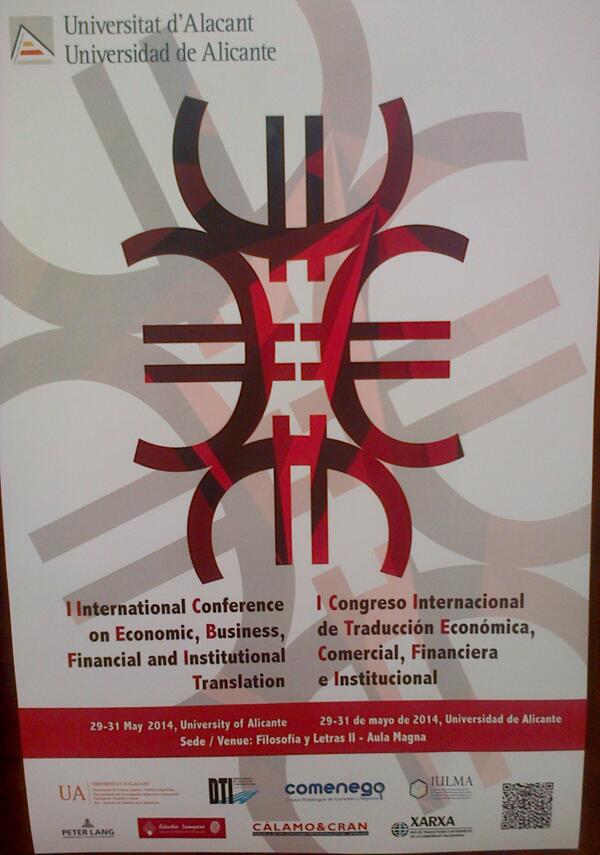Alicante’s “First International Conference of Economic, Business, Financial and Institutional Translation”
Freelancing Interpreting Language events Translation The University of Alicante hosted from 29th to 31st May (2014) the “First International Conference of Economic, Business, Financial and Institutional Translation“, which I had the pleasure to attend. You can see the programme here.
The University of Alicante hosted from 29th to 31st May (2014) the “First International Conference of Economic, Business, Financial and Institutional Translation“, which I had the pleasure to attend. You can see the programme here.
I must admit the conference turned out to be far more academic and research-oriented than I might have thought, but still very interesting. In this post I’d like to offer some comments for those of you who would have liked to come, but finally couldn’t. Yet, I’ll merely mention some of the most pragmatic sessions because it would be impossible for me to summarise properly complex theoretical studies in just few words. Click on the title of the talk you’re interested in.
1. ''Translating for international organizations: freelance translators that provide value added'' by Izaskun Fuentes Milani Orkwis
Izaskun Fuentes Milani Orkwis mentioned the most common myths and truths regarding this topic.
- Institutions only work with people having translation studies. Myth!
- Institutions only work with translators with at least 5-year experience. Officially this is not true, but practically yes, because they do not have the time to train them.
- Institutions pay very well. Truth! Minimum rates are generally $0.17 and €0.16. Yet, the translator’s expected to deliver a flawless and ready-to-publish translation meeting all the terminological requirements and quality standards of the institution in question.
- Institutions are interested in translators with many language pairs and working into both directions. Myth! They value specialisation and quality, which most of times is not compatible with that.
- Institutions expect translators to translate huge volumes of work. Myth! In order to achieve the above-mentioned quality, the normal workflow should be around 2,000 words per day (between 1,850 and 2,200). Stating in your CV that you can translate 5,000 words per day is indeed not a good strategy with an institution!
- Institutions have already many translators available and do not need anymore. Myth and truth: they do have lots of translators already, but they’re constantly looking for good translators.
- They only work with freelancers when in-house translators have too much work. Truth! They have tight deadlines and they need people they can trust 100%.
But how can you get to work with one?
- First of all, you should get or create yourself a list of all the institutions having your mother tongue among the official languages. There’s life beyond the EU and the UN: there are hundreds of them!
- Then you should try to get in contact with them. This might not be that easy. Online you’ll probably will find only a general e-mail adress and the person getting those e-mails won’t be interested in hiring a translator. In fact, as you send there your CV, it won’t be long before it ends up in the trash bin and you won’t get any answer. What you should do instead is to ask for the contact information of the HR person (or similar) you should get in contact with.
- Once you get it, make sure your CV is absolutely flawless before sending it. Proofread it yourself several times and have it proofread by other people until you’re 100% sure. You should state in your CV all the IT expertise you have.
- Even if you’re not lucky the first time, bear in mind that most international institutions do not share their database (not even UN agencies).
- In case you’ve already worked for an institution, say it: it’s a great plus!
2. ''Specialising in financial translation: the experience of an in-house translator in a financial entity'' by Armando Valdés Aumente
Armando shared with us his own experience as an in-house translator in a financial entity. He considers it as a paid master’s since you get a salary to specialise in that field. When it comes to highly specialised texts, it’s difficult to find proper documentation. Especially at the beginning, in fact, you need trustworthy sources and, in that case, the best option is to collaborate with more-experienced colleagues of yours and ask them. If they cannot help you and you have very specific doubts, you should consider crossing the hall and ask some economists (or similar) working in the same company, since they are the experts and, probably, the final users of your translation. Sometimes, for example, they might want you to leave some acronyms in English, even though you find the equivalent in Spanish and are trying to fight against the corporate Spanglish being used there. Moreover, that kind of networking might be really precious: in case you leave the company, they might be potential clients or they could recommend you to somebody else.
How to get there? Normally they look for someone with a certain degree of specialisation in that field, but not always. In fact, sometimes companies would rather train their translators themselves since they have their own policies and terminology.
3. ''Translating contracts: the case for plain language'' by Víctor González-Ruiz & Margarita Esther Sánchez Cuervo
I very much liked Victor’s plain-language approach applied to legal texts. As Victor mentioned, such texts are sometimes very complicated and translators sometimes have difficulties understanding them. As a democratic means, then, translations should be comprehensible for the target audience, namely, citizens themselves and not only lawyers and the public administration. Consequently, such approach implies maintaining the meaning unchanged, but simplifying the structure. In other words, technical terminology should be translated with the proper equivalents, but a long and complex sentence can be divided into several sentences and meaningless expressions that make the text harder to understand should be preferably avoided. Theoretically, people are against this, but when they have to decide between the standard translation and the plain-language version, they prefer the second.
Some sources Victor mentioned (you can click on the link):
“Unfair contract terms guidance” (UK)
“How to write clearly” (EU)
4. ''The top 10 fields in financial translation – Presenting an online introductory course to financial translation designed to complement existing translation programmes at universities'' by Javier Gil González
I already had to pleasure to attend a seminar by Javier, so I knew beforehand that it was going to be very pragmatical and useful. In only 15 minutes he went through what he regards as the top 10 financial areas that generate more work for translators (in alphabetical order):
1. Accounting: boring but lucrative, e.g. financial statement;
2. Banking: e.g. basel III report;
3. Business services: transversal (IT, M&A), e.g. forensics report;
4. Corporate communication: both internal and external communication, e.g. newsletter, press release;
5. Insurance: complex, regulated (solvency II), e.g. insurance policy;
6. International financial organisations: e.g. quarterly progress report;
7. International trade: e.g World Trade report;
8. Investment management: e.g. investment fund report;
9. Public sector
10. Taxation: e.g. transfer pricing report.
After that, he challenged universities by asking if they actually prepare students for these top 10 financial areas with their programmes. He believes they don’t and for this reason he created a very well-designed online course. It’s not ready yet and Javier would like to offer it firstly only to university (as a means to redeem themselves!) and not to single translators.
5. ''Unethical practices of interpreters in business negotiation settings'' by Panagiota-Penny Karanasiou
Last but not least, Penny was the only focusing on interpreting (a real pity from my highly-biased point of view), but her talk was worth ten. She challenged the current interpreting codes of ethics, which allow very little flexibility. Yet, conference interpreting settings are indeed very different from a court setting, a hospital interpreting situation and business negotiations, on which she focused the most. According to her, in interpreting, being a service provision profession, you need to adapt the code of ethics to the specific contextual situation you are in. Your clients’ needs (i.e. the aim of the meeting) and common sense should help you understand whether you should stick 100% to it or not. In a business situation, in fact, you cannot merely translate words, you might also need to warn your client beforehand of potential cultural gaps and habits and let him know if the meeting is not going the way it should because of some misunderstandings (e.g. when noticing irony or disappointment in the other person’s voice). He might even ask you to speak to the other person for a while, without even providing him with the translation, because he’s simply not interested and tired and you, for the sake of the deal, should probably simply do it. In that situation, you cannot simply be a mere code-switcher and nothing more. It’s not all black and white in interpreting.
Unfortunately, these are only few of the many papers and contributions presented during the conference. If you want to know more about the other talks you can check the hashtag “#tradEco_Alicante” on Twitter.
I highly recommend coming next time, whenever it will be (we don’t know it yet). For me it was a wonderful opportunity to see again some colleagues I already knew and to get to know others, with whom I am looking forward to collaborating very soon. Last but not least, thanks again to all the organisers and students who volunteered to interpret and help: you did a great job!
